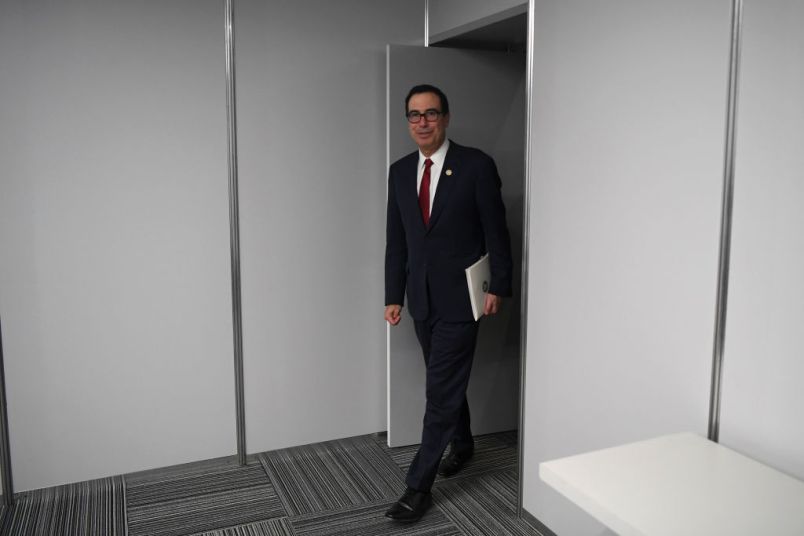International Monetary Fund Managing Director Christine Lagarde has warned that the tariffs could significantly harm the global economy, lowering growth by about 0.5 percent “in the worst case scenario.”
“These meetings have been taking place in an international context which is very challenging,” European financial affairs commissioner Pierre Moscovici told reporters Sunday. “Trade tensions remain high and they threaten to escalate further.”
But the EU’s top economy official said the two-day summit that began Saturday has not been “tense,” and that countries must remain “cool-headed and maintain a proper sense of perspective.”
Representing the U.S. at the meetings is Treasury Secretary Steven Mnuchin, who on Saturday said the overall U.S. economy has not been harmed by the trade battles set off by President Donald Trump’s get-tough policies. But he acknowledged that some individual sectors have been hurt and said U.S. officials are looking at ways to help them.
The U.S. and China have hit each other with tariffs on $34 billion goods with another $16 billion in penalty tariffs in the pipeline. The Trump administration is preparing to impose tariffs on another $200 billion and threatening to add $300 billion more to that figure.
Washington has also imposed tariffs of 25 percent on steel and 10 percent on aluminum, including from Europe. China, the EU, Canada, Mexico and Turkey have counterpunched with taxes on more than $24 billion worth of U.S. exports.
“Protectionism, I want to insist on that, is good for no one,” Moscovici said. “Trade wars are not easy … they create no winners, only casualties.”
But Moscovici said that the EU remains open to dialogue.
“That’s why EU President Jean-Claude Juncker and Eu Trade Commissioner Cecilia Malmstrom will meet with Trump” in Washington D.C. next week, he said. “We hope this meeting will be productive and successful.”
Global markets have remained generally calm despite the U.S.-China trade war and the other conflicts ignited by Trump.
But analysts say they expect Trump will impose more tariffs on China and potentially other key U.S. trading partners. With those nations almost certain to retaliate, the result could be higher prices for Americans, diminished export sales and a weaker U.S. economy by next year.
Officials in Buenos Aires are also discussing issues including the future of work and infrastructure for development, the international tax system and financial inclusion. It is the third of five meetings by finance ministers and central bankers scheduled in advance of a main G-20 meeting in Argentina that will be held Nov. 30-Dec 1.
On Sunday afternoon, participants were still working on the details of a final draft of a resolution from the meeting. The Group of 20 nations is composed of traditional economic powers such as the United States, Japan and Germany and emerging economic powers including China, Brazil, India and Argentina.



